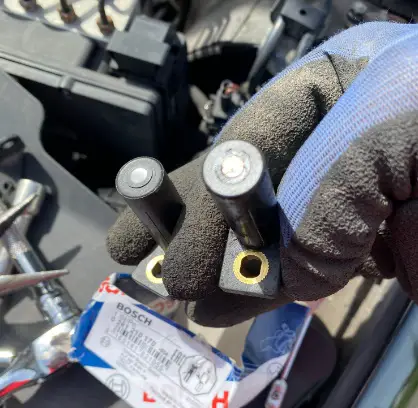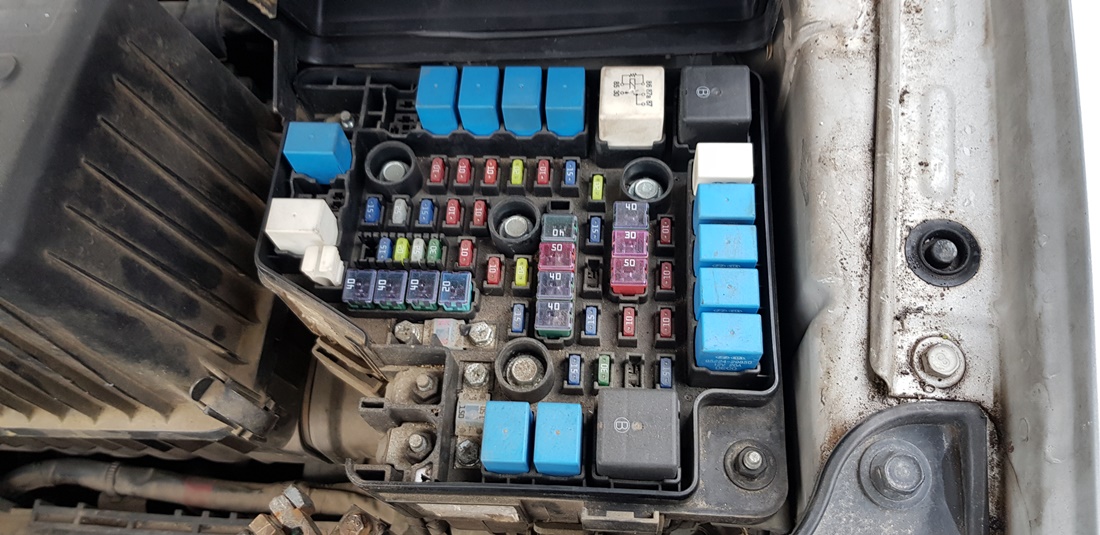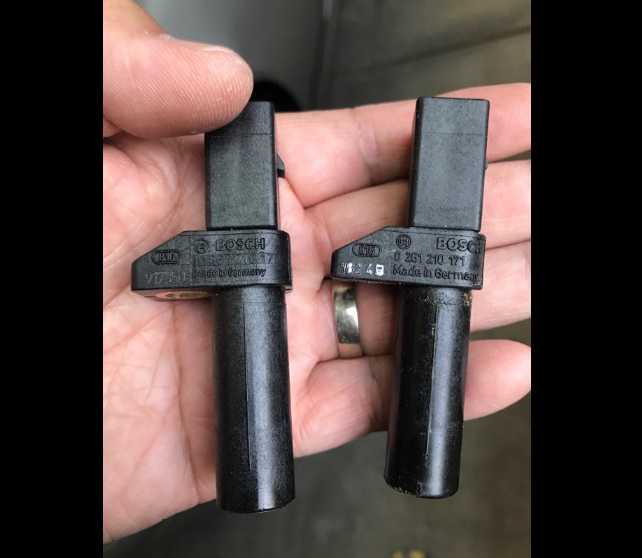Have you heard weird noises as soon as you turn your engine on? Are you wondering why is my car ac squealing and how to fix it?
If you hear squalling noises as soon as you turn on your AC, that is an indicator that your AC compressor or your AC belt is failing.
Having a bad ac compressor or cracked belt won’t hurt the overall engine operation, but you won’t get cold air into the cabin. The squealing noises are a bonus.
Key Takeaway
- A car’s AC system may squeal due to a cracked or broken AC belt, faulty AC compressor clutch, faulty AC compressor pulley, and bearings, or because of debris in the blower motor.
- Fixing a squealing car AC typically involves inspecting and potentially replacing the AC belt, cleaning or replacing the blower motor if it’s filled with debris, or repairing or replacing the AC compressor clutch, pulley, or bearings if they’re faulty.
Why is My Car AC Squealing and How To Fix It

Your car AC squeals because of a cracked or broken AC belt, faulty AC compressor clutch, or faulty AC compressor pulley and bearings.
The squealing noises are annoying, trust me I know. But, they can be fixed. Before we start, you need to make sure that you are only getting a squealing noise after you turn on the AC.
I am saying this because the engine can produce squealing noises for many other reasons. Here are the top 3 reasons why your car AC is squealing:
1. Faulty AC Compressor Clutch
If your AC compressor clutch is faulty, your AC will not blow cold air and will make a squealing noise as it tries to engage. The AC compressor clutch is one of the most important parts of the air conditioning system in your vehicle.
This part is in charge of pressurizing the entire air conditioning system with the additional task of pushing the refrigerated air through the cooling system. Because of these two important tasks, the AC compressor clutch is cycling on and off, and over time it starts to wear and break.
2. Bad AC Compressor Pulley and Bearing
The AC compressor pulley is connected by a drive belt and rotates at all times when the engine is running. A bad ac compressor pulley and bearing can make squealing noises while rotating. The AC compressor pulley rotates, but not the AC compressor shaft. The only time the AC compressor shaft rotates is when the AC unit is turned on.
Rotating all the time when the engine is turned on, this item can wear over time and make squealing noises. There are some reasons why the AC compressor pulley and bearing fail prematurely.
3. Broken AC Belt
The AC belt connects the AC compressor clutch and the engine crankshaft which allows the AC compressor clutch to rotate every time you start your engine. A cracked or worn-out AC belt will produce squealing noises when you turn the AC on.
There are two types of AC belts: V-belt and Serpentine belts. The difference between the two is their shape. If you hear squealing noises as soon as you turn on your AC, your AC belt could be up for a replacement.
Why AC Compressor Clutch Fails
If your AC compressor clutch is faulty, you will hear a squealing noise and you won’t get cold air. Here are a couple of reasons why the AC compressor clutch fails:
- Low AC Refrigerant: Having low levels of AC refrigerant is one of the reasons why the ac compressor clutch is not engaging or making squealing noises as it tries to engage. The AC system has sensors that will measure if the overall system is pressurized correctly. If there is something wrong with the pressure, the AC clutch won’t engage. Being low on refrigerant will have your compressor working twice as hard to try and cool the air.
- Worn-Out Components: The AC compressor clutch has many components such as bearings, brackets, and tensioners. Most of us drive with the AC turned on almost all the time which makes the AC clutch work hard. Over time, these components will wear out and the AC compressor clutch will fail. Also, dust, oil, and moisture will build up over time on the AC compressor clutch and can make it fail.
- Components Not Installed Correctly: As I mentioned before, the AC compressor clutch has many components. Sometimes, the AC technician makes a mistake and installs some of the tiny components wrong. A wrongly installed bearing will not show any failing signs right away but will do so in the future. Human error is present in all fields and there is nothing we can do about it.
How To Repair The AC Compressor Clutch
The AC compressor clutch turns on and off the compressor when you turn it on and off the AC unit. Having such an important task, the AC compressor clutch is bound to fail at some point.
Once you uninstall the AC compressor clutch, you can take it to a mechanic to repair it, or you can get a new compressor clutch. 
How you can repair the AC compressor clutch:
- Remove the AC belt with a wrench. The compressor’s magnetic coil has a connector that you will need to disconnect. There should be a 6mm socket on the center of the AC clutch which you will need to remove.
- Disconnect and pull out the clutch. Make sure that you don’t lose the spacers from the shaft because they gap the clutch and you will need them later on. On the shaft, you will see a snap ring, remove it and slide it off the shaft.
- Clean all the parts that you just uninstalled. You can use a WD40 to clean all the parts. Once you are done with the cleaning, insert the new pulley and put the snap-ring back.
- Install just one spacer on the shaft, then install the new clutch. Use the 6mm socket to fasten the bolt.
- Measure the gap between the clutch and pulley with a feeler gauge. If the clearance is incorrect, you should add another spacer. The recommended gap is determined by the car manufacturer.
- Test the AC compressor clutch. If everything goes well, the AC compressor clutch should engage at this point. Turn on the AC and see if the clutch engages.
Why AC Compressor Pulley and Bearing Fails
When the AC compressor pulley and bearing fail, you can hear a squealing noise coming from the engine. Here are a couple of main reasons why the AC compressor pulley and bearing fail:
- Excessive heat: Excessive heat is the biggest enemy of all car AC components. As the AC compressor pulley rotates along with the bearing, excessive heat is created that will cause damage to the pulley and bearing seal. The heat generated by the rotation can reach up to 1200 degrees Fahrenheit. This heat will dry the grease in the bearing and without the grease, you will get a squealing noise.
- Leaking Refrigerant: If the AC refrigerant lines are broken, the refrigerant would leak. Apart from the low refrigerant level, there is another problem. At this point, the compressor would work twice as hard to try and make up for the low refrigerant and will create even more heat.
- Leaking Compressor Shaft Seal: When the seal from the compressor shaft leaks, it finds its way into the bearing grease and gets contaminated. The shaft seal and bearing grease have different properties. The grease inside the bearing would no longer be able to lubricate as it should which will lead to failure.
- Overall Wear: As I said before, the pulley rotates every time you turn on your engine. As with other rotating items, the AC compressor gets worn out and is not performing as it should. The same goes for the bearing. The seal that they have inside could get dry over time and it will create squealing noises.
How To Repair The AC Compressor Pulley and Bearing
The AC compressor pulley and bearing are essential to the air conditioning system. They are rotating as the engine is turned on.
When the user requests cold air by turning the AC on, the compressor pulley and bearing start to spin along with the compressor clutch, and the cold air starts flowing says Ratchets and Wrenches.
If you have a damaged AC compressor pulley and bearing, here is how you can replace them:
- Locate the AC Compressor: On most vehicles, the compressor is in the engine bay on the passenger side. You can access it from the top or from the side by removing the passenger side tire.
- Remove the AC belt and remove the compressor clutch. You will need a 6mm socket to remove the compressor clutch. Once disconnected, pull it out.
- Rotating the compressor pulley: Try rotating the compressor pulley. If it doesn’t rotate, then the issue is the compressor pulley. If it rotates and makes squealing or knocking sounds, the bearing could be the issue.
- Remove the pulley from the compressor: You can use a hammer to remove the compressor pulley or a two-jaw puller.
- Change out the compressor pulley(if needed): If it’s not just the bearing that is damaged, you would have to replace the whole compressor pulley and install a new one.
- Change out the bearing(if needed): The bearing is located inside the compressor pulley. If you have a bad bearing, you can replace them. To take them off, you would need a socket and a hammer. Once the bearing is out, replace it with a new one.
- Install the pulley onto the coil. At this point, you are doing all the steps that you did, but in reverse.
- Test the new pulley and bearing: When you are done with the installation, test the new pulley and bearing by rotating the pulley to see if you can hear any squealing noise.
Common Signs of Failing AC Belt
- AC belt squealing when turned on: This is probably the most common sign that your AC belt is failing. As soon as you turn on your AC unit, you can hear a squealing noise coming from the belt. The squealing sound could be because the belt is loosened, or if water or oil gets on the belt. But, in most cases the belt squeals because it is severely worn and it can’t get the proper grip to rotate the pulley.
- Lots of cracks on the AC belt: As the AC belt spins, it gets heated, and as we know the heat is a big enemy to the AC components. Over time, from the heat and dryness, the AC belt starts to crack. You can perform a visual inspection to see if your AC belt is cracked. If it is, you should replace it immediately.
- Broken AC belt: This is an obvious sign. If you open the hood and you see that your AC belt is broken, you need to get a new one. The AC will not work without the AC belt.
How To Fix a Broken AC Belt
If your AC is making a squealing noise and it is coming from the belt, it’s best if you replace it on time. A squealing noise means that your AC belt is failing and it is a matter of time before it gets broken. Here is how to replace a broken AC belt:
- The first thing that you need to do is locate the AC belt. Most AC compressors are located in the engine bay on the passenger side. The AC belt is the belt that is routed over the AC compressor.
- Check your AC belt type: As I mentioned before, the AC belt can be a v-belt or serpentine belt. The difference is their size. The v belt is thinner with only one rib. The serpentine belt has more than one rib.
- Locate the AC belt tensioner and loosen the bolt with a wrench. The AC belt tensioner can loosen with a clockwise or counterclockwise rotation depending on the vehicle.
- Remove the AC belt with your hands. Once you loosen the AC belt tensioner, you should be able to remove the belt with your bare hands. Make sure that the pulleys are clean and that no rubber from the belt is left on them.
- Install the new belt and tighten the AC belt tensioner. Once you place the new AC belt on the pulleys, you can tighten the AC belt tensioner.
- Test the new AC belt. At this point, you should hear no squealing noises coming from the AC.
Why Is My AC Making a High-pitched Noise?
- Reduced Airflow: High-pitched noises often indicate that there is not enough airflow going through the vents and ductwork. This could be due to a clogged filter or blocked vents, which increases pressure and velocity, causing a louder and higher sound.
- Fan Belt Issues: If the belt connecting the motor to the blower has slipped or is worn out, it can create a high-pitched squealing noise.
- Faulty Bearings: The bearings of the condenser fan might be worn out or damaged, leading to a screeching noise.
- High Pressure in the Compressor: If the pressure inside your air compressor is too high, it can cause a hissing or high-pitched noise. This might be due to an overcharged system or blockage in the refrigerant lines.
Is It OK If AC Makes Noise?
While some noise from your air conditioner is normal, particularly when starting up or shutting down, persistent or unusual noises can be a sign of a problem that needs to be addressed.
However, if you start hearing high-pitched squealing, grinding, rattling, hissing, or banging noises, these could indicate a variety of issues such as a motor problem, refrigerant leak, loose parts, or even a failing compressor.
These noises are not normal and should not be ignored as they can lead to more serious damage or potential system failure.
Why Is My Car AC Hissing?
The most common cause of AC hissing sound is air passing through a small opening somewhere in the system, such as a cracked hose or a damaged compressor.
This problem can also be caused by an incorrect installation, worn sealing material within the system, or low refrigerant levels.
If the hissing sound is accompanied by other noises such as grinding or squealing it could indicate a more serious issue with one of the components in your AC system.
In any case, if you notice a hissing noise from your car’s AC it should be addressed immediately to avoid further damage and costly repairs.
FAQs
Q: How do I know if my car AC is squealing?
A: You will typically hear a high-pitched squealing noise coming from the engine compartment when the car AC is on. The noise may get louder as you increase the AC settings.
Q: Can a squealing car AC damage my vehicle?
A: Yes, a squealing car AC should not be ignored as it can lead to further damage to the AC system or other components of the vehicle. It is important to address the issue promptly to prevent any potential issues.
Q: How can I fix a squealing car AC?
A: The first step is to identify the cause of the squealing. If it is due to a worn-out serpentine belt, it may need to be replaced. If the issue lies with the compressor pulley or belt tensioner, those parts may need to be repaired or replaced.
Q: Can I fix a squealing car AC myself?
A: If you have the necessary knowledge and experience with car repairs, you may be able to fix a squealing car AC yourself. However, it is recommended to consult a professional mechanic for a proper diagnosis and repair to ensure the issue is resolved correctly.
Q: Are there any temporary fixes for a squealing car AC?
A: In some cases, applying a belt dressing or lubricating the AC belt may temporarily reduce or eliminate the squealing noise. However, these are temporary solutions and the underlying issue should still be addressed to prevent any further damage.
Q: How much does it cost to repair a squealing car AC?
A: The cost of repairing a squealing car AC can vary depending on the specific cause of the issue and the labor rates in your area. It is recommended to get a few quotes from different mechanics to determine the most cost-effective option.
Q: Can a squealing car AC be prevented?
A: Regular maintenance of the AC system, including checking and replacing the serpentine belt as recommended by the manufacturer, can help prevent a squealing car AC. Additionally, addressing any unusual noises or issues promptly can prevent further damage.
Q: How often should I replace the serpentine belt in my car AC?
A: The frequency of serpentine belt replacement can vary depending on the make and model of your vehicle. However, it is generally recommended to replace the serpentine belt every 60,000 to 100,000 miles or as recommended by the manufacturer.
Q: Can extreme weather conditions affect a car AC and cause it to squeal?
A: Yes, extreme weather conditions such as high heat or extreme cold can put additional strain on the AC system and potentially cause a squealing noise. Proper maintenance and regular inspections can help identify and address any weather-related issues.
In Conclusion
A squealing car AC can be a sign of several issues, including a faulty AC compressor clutch, debris in the blower motor, a worn-out or loose AC belt, or a malfunctioning compressor.
These problems can hinder the functioning of your AC, and it’s crucial to address them promptly to avoid further damage.
Temporary fixes like using a motor lubricant might alleviate the noise, but for a lasting solution, it’s best to consult a professional.
Regular maintenance, such as checking the AC belt and cleaning or replacing the air filter, can help prevent these issues from arising.
Remember, ignoring these signs can lead to costly repairs or even a complete AC system replacement in the long run.




